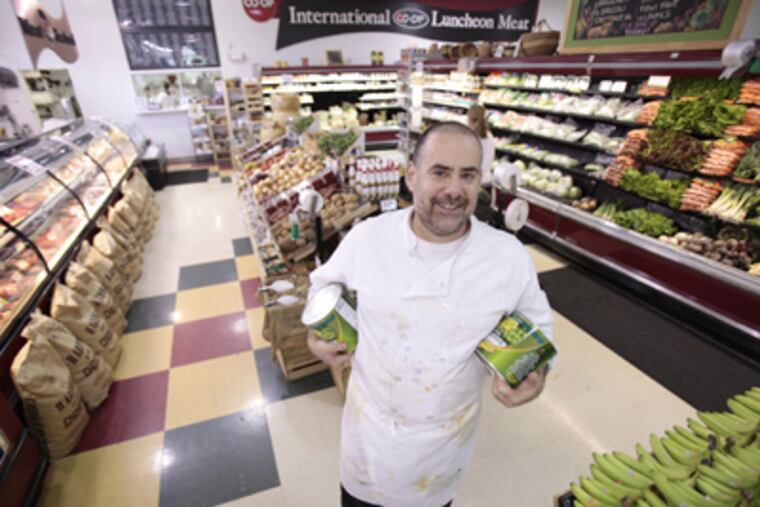Food co-ops on rise in Philly area
Pam Seida browses the aisle at Mariposa Food Co-op in West Philadelphia, looking for tempeh bacon, which she insists is "yummy."

Pam Seida browses the aisle at Mariposa Food Co-op in West Philadelphia, looking for tempeh bacon, which she insists is "yummy."
The space is cramped, but Seida, 44, has shopped here for a decade, since moving from Rosemont. And yes, she is delighted that a new building is under construction just one block away.
The $2.6 million structure, to open in January, will be five times bigger, with vertical farming, bee hives, and a demonstration kitchen on the roof; dry-goods storage and cisterns for harvesting rainwater in the basement; a cafe and a classroom on the mezzanine; and, on the ground floor, aisles and aisles of locally grown produce, dairy, beef, and Seida's favorite, tempeh bacon.
Even as the economy bleeds jobs, the number of member-owned food co-ops is doubling - in this region and across the country.
Four established co-ops, Swarthmore (started in 1937, making it the oldest), Weavers Way in Mount Airy and Chestnut Hill, Mariposa, and Selene, in Media, are guiding the growth of Chester's Community Co-op, which opened in March, and four more planned co-ops, in Doylestown, Elkins Park, Kensington, and South Philadelphia.
Nationally, the raw numbers are relatively small - Stuart Reid of the Food Co-op Initiative cites 325 existing co-ops and 300 in various stages of starting - but each has hundreds, if not thousands, of members and many boast revenues in the millions.
About 25 of the projected start-ups are in the six states that make up the mid-Atlantic region, says Bob Noble, who heads the newly formed Mid-Atlantic Food Cooperative Alliance.
Co-ops, which have had their cyclic ups and downs since coming on the scene in the 1840s, may be on the upswing again, Reid says, because of the intense interest in eating food that is locally grown using environmentally friendly, sustainable methods. And there's evidence to support that claim.
But Craig Borowiak, a Haverford College assistant professor writing a book on co-ops, suggests with some irony that the dismal economy is spawning this positive development.
"People are alienated, people are anxious, people are suffering, people are hungry," Borowiak says. "And co-ops offer a mechanism to deal with some of those problems."
Instead of finger-pointing and blame, the principles of cooperation that bind food co-ops prompt members to look to one another for support.
"A food co-op," Borowiak says, "is a microcosm of democracy."
As member-owned grocery stores and gathering spots, food co-ops educate and engage. They support small farms, reduce carbon emissions, stabilize neighborhoods, and spawn economic development.
That's why U.S. Rep. Chaka Fattah (D., Pa.) says he will introduce the National Cooperative Development Act of 2011 next month.
Fattah will seek an appropriation of $25 million annually through 2015, creating a National Development Center under the U.S. Department of Housing and Urban Development, which will make loans and grants to all kinds of co-ops - not just those that sell food - and to organizations that support co-ops (such as universities).
Food deserts - neighborhoods without supermarkets - would be a priority, he said. Co-ops mean job growth and economic expansion.
Alliances and associations aside, each co-op is independent, with its own bylaws and board. Some welcome shopping by nonmembers and give discounts to members; others turn nonmembers away at the cash register.
The days when co-ops required members to work a certain number of hours each year are gone - long ago changed to comply with labor laws. Some co-ops offer additional discounts to members who volunteer their labor, but all are professionally run.
Proceeds from sales go into improvements or expansion, or are reinvested locally, as members see fit.
Co-ops also are credited with pioneering the use of nutritional labeling, bulk purchasing, and unit pricing.
"Every co-op is expected to assist others that get started," says Noble, who is on the board of Weavers Way.
Thus co-ops tend to cluster in high-population areas where there are already strong co-ops that act as mentors.
On average, the start-up time is four or five years, Noble says, and the cost ranges from thousands to hundreds of thousands of dollars.
Capital comes from member equity and loans; banks; or from community investment groups such as Philadelphia's Reinvestment Fund. Federal funding is not an option, but federal loan guarantees are possible.
Creekside Co-op in Elkins Park is closest to opening. Talk of forming a food co-op at the site of the old Ashbourne Market started in 2007, says Dan Reynolds, the board president.
More than 1,300 neighbors joined that year, paying into what was still a dream. (Mariposa, by contrast, has been around for decades and has fewer than 1,000 members.)
And while it now has $3.5 million in financing, Creekside needs $250,000 more from members if it is to open in the summer. The Creekside board feels confident it will reach its goal.
With his proposed legislation, Fattah sees great possibilities.
"We're at a tipping point," he says, "where we can really grow the co-op movement nationwide."
Area Co-ops
Chester's Co-op
Fifth Street and Edgemont Avenue, Chester
610-447-1414
chestercoop.com
Mariposa Co-op
4726 Baltimore Ave.
215-729-2121
Mariposa.coop
Selene Whole Foods Co-op
305 W. State St., Media
610-566-1137
selenecoop.org
Swarthmore Co-op
341 Dartmouth Ave.,
Swarthmore
610-543-9805
swarthmore.coop
Weavers Way
559 Carpenter Lane
215-843-2350
8424 Germantown Ave.
215-843-2350
weaversway.coop
Planned Co-ops
Creekside
Elkins Park
Creekside.coop
Doylestown
doylestown.coop
Kensington Community
Food Co-op
kcfoodcoop.com
South Philly Food Co-op
southphillyfoodcoop.orgEndText